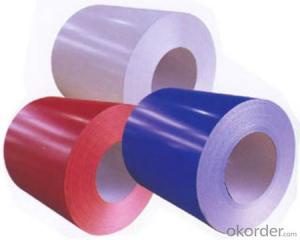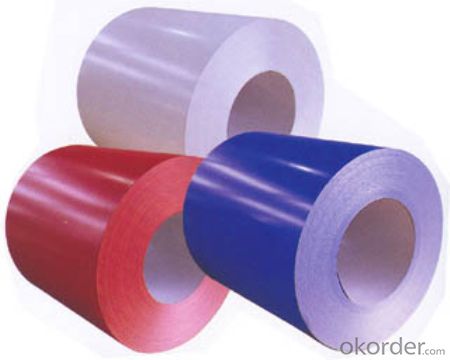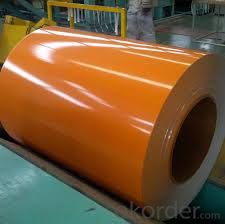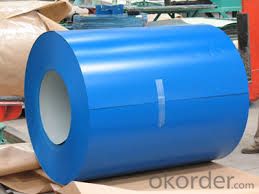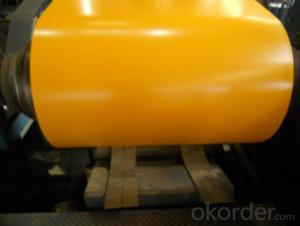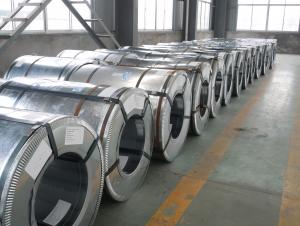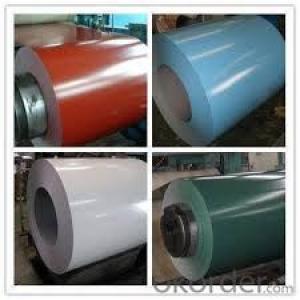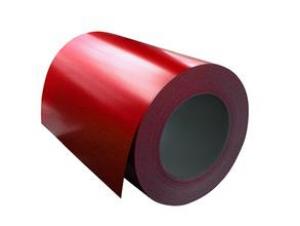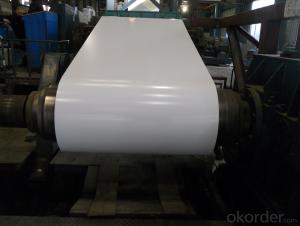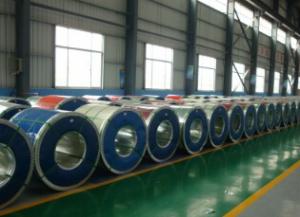Home Appliance Steel Sheet / Prepainted Galvanized Steel
- Loading Port:
- Shanghai
- Payment Terms:
- TT OR LC
- Min Order Qty:
- 25 m.t.
- Supply Capability:
- 12000 m.t./month
OKorder Service Pledge
OKorder Financial Service
You Might Also Like
Product Description
From China Manufacturer PPGI/PPGL Prepainted Galvanized Steel For Building Steel Material / Roofing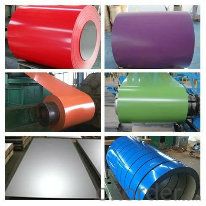
1) Price terms: CIF CFR FOB
2) Payment: T/T or L/C at sight
3) Shipping port: Qingdao China
4) Samples are available and free of charge
5) Coil ID : 508 / 610 MM
6) Packing: seaworthy packing
7) Delivery: about 10-15 days upon the day of deposit and L/C opening
Product | PPGI/PPGL | Galvanized | Galvalume/Aluzinc | |
Certificate | ISO9001,ISO14001 | |||
standard | ASTM A755 | ASTM A653 | ASTM A792 | |
Grade | CGCC/CGLCC | SGCC/CS/DX51D | SGLCC/CS/DX51D | |
Model | Thick:0.16-0.90mm | Thick:0.14-3.5mm | Thick:0.23-2.0mm | |
Type | Roll/Coil | Roll/Coil | Roll/Coil | |
surface | Protective | Chromating Treatment Oiled | ||
Application | Structural,Roofing,Commercial use,Household Appliance,Industry | |||
Special | Wear resistant steel,High-strength-steel plate | |||
Q&A Do you accept OA payment terms?
ANSWER: Yes, sure, but it normally depending on the order value
- Q: What is the role of steel coils in the oil and gas industry?
- Steel coils play a crucial role in the oil and gas industry. They are primarily used for the transportation and storage of oil and gas products. These coils are typically made of high-quality steel and are designed to withstand the harsh conditions encountered during the extraction, processing, and distribution of oil and gas. One of the main functions of steel coils in the oil and gas industry is to serve as transportation containers. Oil and gas are often transported over long distances, either through pipelines or by tankers. Steel coils are used to construct these pipelines and storage tanks, providing a robust and secure means of transporting these valuable resources. The durable nature of steel ensures that the pipelines and storage facilities can withstand the pressure and temperature fluctuations that occur during the transportation process. Steel coils are also an essential component in the production of drilling equipment. The drilling process involves extracting oil and gas from deep underground reservoirs. Steel coils are used to manufacture various components of drilling rigs, such as pipes, casings, and wellheads. These components must be able to withstand high pressures and temperatures encountered during drilling operations. Steel coils provide the necessary strength and durability to ensure the reliability and safety of drilling equipment. Furthermore, steel coils are used in the construction of offshore platforms. These platforms serve as bases for drilling operations in offshore oilfields. The harsh marine environment, including saltwater exposure and strong winds, requires materials that can withstand corrosion and provide structural integrity. Steel coils are used to fabricate the structural components of these offshore platforms, ensuring they can withstand the challenging offshore conditions. In summary, steel coils play a vital role in the oil and gas industry. They are used for transportation and storage of oil and gas products, construction of pipelines and storage tanks, manufacturing of drilling equipment, and fabrication of offshore platforms. The strength, durability, and resistance to harsh conditions make steel coils an indispensable material in the oil and gas industry.
- Q: which one(glass or steel)has more power and velocity? im planning on using my slingshot for hunting.
- definitely steel. i used to hit bullseyes with a good slingshot, and you need heavy, perfectly spherical small steel shot. smaller than a marble, bigger than a bb.
- Q: Aluminum and Steel brittle or ductile based on these results? and why? Steel Aluminium% Elongation 0.2510.2705Modulus of E in ksi11833.33964.71Tensile Strength (ksi)87.5 51.5Yield Strength (ksi)78.5 41
- Only steel(of this pair)might be liable to brittle fracture,which would be implied by almost zero elongation or reduction in area at fracture.On this basis the steel has not failed by brittle fracture.I would expect much more elongation in pure aluminium than your sample shows so I presume it to be brittle unless it is an alloy rather than commercially pure aluminium.However brittle fracture in metals is a particular phenomenon to be determined by impact tests and examination of fracture surfaces and is particularly relevant to metals with the body centred crystal structure.
- Q: What are the different types of steel coil storage systems?
- There are several different types of steel coil storage systems, including coil racks, coil cradles, coil saddles, and coil bunks. Each of these systems is designed to safely and efficiently store steel coils in a warehouse or manufacturing facility. Coil racks are typically used for larger, heavier coils and have adjustable arms to accommodate different sizes. Coil cradles are used for smaller coils and provide a stable base for storage. Coil saddles are specifically designed to hold and transport coils with overhead crane systems. Coil bunks are used for storing large quantities of coils and provide a stacking system to maximize space utilization.
- Q: What are the dimensions of steel coils used in the automotive industry?
- The dimensions of steel coils used in the automotive industry can vary depending on the specific application, but common dimensions range from 0.5mm to 3mm in thickness and 600mm to 2000mm in width.
- Q: What are the common methods of slitting steel coils?
- The common methods of slitting steel coils include rotary slitting, multiblade slitting, and shearing.
- Q: Will a 1 inch thick A36 steel target withstand a 7.62x54r round?
- It sure will. It will also be a major pain in the back side to move it to where you can safely shoot at it.
- Q: How are steel coils used in the manufacturing of safety systems?
- Steel coils are commonly used in the manufacturing of safety systems as they provide strength, durability, and stability to various components. These coils are often transformed into springs, which are crucial for absorbing and distributing impact forces during accidents or sudden movements. Springs made from steel coils are utilized in seatbelt retractors, airbag systems, suspension systems, and other safety mechanisms to enhance overall safety and protect occupants in vehicles and various industrial applications.
- Q: I'm analysing horse stirrups and would like to know the disadvantages to stainless steel? - thanks
- For horse stirrups the main disadvantage to stainless steel is the manufacturing cost. Stainless steels tend to work harden, and are subject to their own peculiar forms of corrosion, but I see little implication to either of these factors when used as a stirrup iron or a safety latch. Stainless steel is also subject to self welding, or galling, this would be of no concern for the irons, but could result in the pivot of the safety latch freezing (I have never known anyone to ride with the safety latch closed, however).
- Q: which cost more: ALLOY, GUNMENTAL OR STAINLESS STEEL. GIVE ME AN IDEA OF THE COST OF EACH.
- Alloy okorder /
Send your message to us
Home Appliance Steel Sheet / Prepainted Galvanized Steel
- Loading Port:
- Shanghai
- Payment Terms:
- TT OR LC
- Min Order Qty:
- 25 m.t.
- Supply Capability:
- 12000 m.t./month
OKorder Service Pledge
OKorder Financial Service
Similar products
Hot products
Hot Searches
Related keywords
